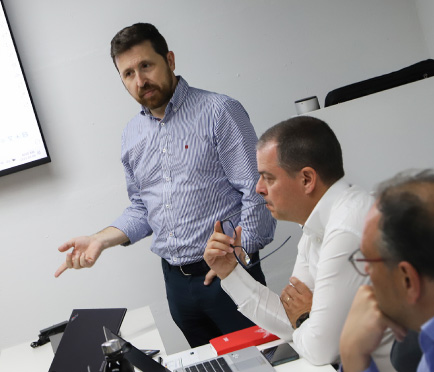What can we expect from 2025 in terms of cybersecurity trends for businesses? In an increasingly dynamic and complex global landscape, a fast-paced year is anticipated.
From AI as a weapon for attack and defense to challenges in supply chains, increasingly complex threats, and a legislative context that brings more responsibilities for organizations, these are the 7 main cybersecurity trends for businesses in 2025.
Cybersecurity in 2025: Key Trends
1. AI as a Weapon for Attackers…
Artificial Intelligence is bringing innovation and increasing efficiency in organizations, but there is also a sinister side to its use. Cyberattacks using AI have been—and will continue—rising in 2025, with this technology enabling levels of sophistication never seen before.
For example, AI-powered malware can change its behavior in real-time and thus “evade” traditional detection methods, exploiting vulnerabilities with impressive precision levels. On the other hand, AI helps prepare attacks more quickly, with phishing campaigns using advanced natural language processing to create highly personalized and convincing emails, increasing the likelihood of a successful attack.
Technologies like deepfakes add a new layer of complexity, as they allow the use of executives’ or employees’ images through convincing audio and video, which can lead to financial fraud or reputational damage. Traditional security mechanisms may fail to detect and respond to the adaptive and dynamic nature of AI-driven attacks, leaving organizations vulnerable to significant operational and financial impacts.
2. …and AI as a Defense Pillar
To remain secure against AI-driven attacks, organizations must invest in security solutions… also with AI.
From managing and processing large volumes of data to detecting small anomalies and predicting future threats, AI can help significantly increase efficiency levels in the fight against cybercrime. It is likely that, in 2025, AI will become fundamental in all areas of cybersecurity, from threat detection and incident response to strategy formulation.
AI systems are particularly effective at analyzing complex data sets to identify patterns and recognize vulnerabilities that might otherwise go unnoticed. They also excel in more routine checks, freeing teams to focus on more complex and creative tasks.
3. Increase in Zero-Day Vulnerabilities
Zero-Day vulnerabilities remain one of the biggest threats to cybersecurity. In these types of attacks, software flaws not yet identified by development and security teams are exploited, and their impact can be very damaging.
Organizations must mitigate risks through continuous monitoring and advanced detection systems that identify exploitation attempts through behavior. Facing Zero-Day threats requires agility in response, combined with prevention through secure coding, patching, and regular updates.
4. IoT Vulnerabilities: the Threat to Smart Devices
One of the major technology trends in the Industry and Logistics sectors is the Internet of Things (IoT), which involves a set of connected sensors and devices that allow data collection, analysis, and process optimization. However, there is also a downside. Hackers can exploit poorly configured or unprotected devices, accessing the network and sensitive data, potentially causing operational disruptions.
Therefore, cybersecurity teams should not overlook this area, investing in strict security policies that include firmware updates and possibly using a separate network for IoT devices, limiting their exposure.
5. The Growing Importance of Cybersecurity in Supply Chains
Security breaches in supply chains are increasing, with attackers exploiting vulnerabilities in third-party suppliers that allow them to infiltrate larger networks.
Unfortunately, monitoring these third-party relationships is often insufficient, representing significant risks, as supply chain attacks can have cascading effects, affecting multiple organizations and industries.
The good news is that AI-based solutions can help identify vulnerabilities even in the most complex supply chains. Additionally, organizations should review service level agreements (SLAs) to select suppliers that maintain strict security protocols, thus reinforcing security throughout the entire chain.
6. New Cybersecurity Legislation
The European landscape in cybersecurity has evolved significantly, with the European Union (EU) implementing measures to strengthen digital resilience and protection against cybercrime.
After its publication at the end of 2022, the NIS2 Directive will be transposed to all EU member states and is expected to come into force at the beginning of 2025, after the public consultation period and submission of the proposal to the Assembly of the Republic.
NIS2 covers public and private entities in strategic sectors such as energy, transport, health, banking, digital infrastructure, among others, which will have to adopt cybersecurity risk management and incident notification measures. Check out the PONTUAL article on the NIS2 Directive to learn all about this law and its impact on national companies.
7. Increasing Demand for MSP and MSSP Services
It is estimated that, globally, we will continue to see an increase in demand for managed IT and Security service providers. On one hand, organizations, including SMEs, are more aware of cybersecurity issues, but on the other, they also realize the shortage of internal resources and skills they have, leading to the MSP (Managed Services Providers) and MSSP (Managed Security Services Providers) market continuing to grow.
PONTUAL is the Managed Services Provider that provides services to all sectors of activity, focusing on areas such as cloud hosting, cybersecurity, disaster recovery, and backups, among others. We ensure our clients real-time monitoring of their IT systems, so they can focus 100% on their business results.
We are also partners with leading global IT service providers, such as Watchguard, Microsoft, or Acronis, who regularly launch updates and new products in the market, ensuring their partners and, consequently, end customers, solutions with high-quality standards.
Want to know more about PONTUAL’s MSP services? Contact us.






